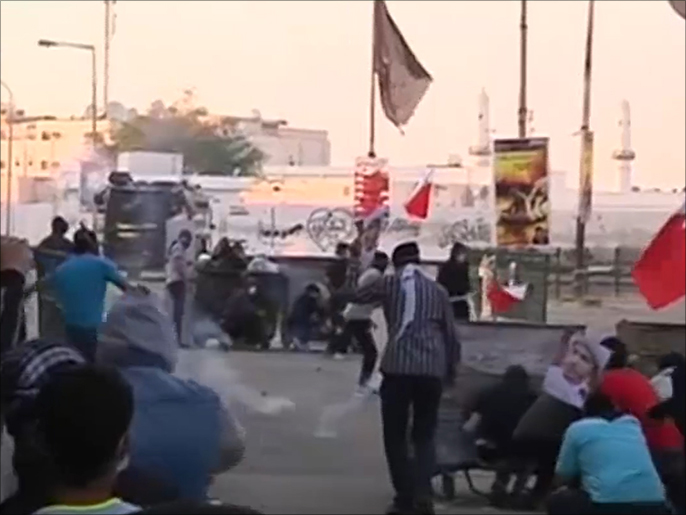Eleven deputies in the British House of Commons sent a letter to Foreign Secretary Dominic Raab criticizing human rights violations in Bahrain, and calling for action against Manama.
And the message - which came in conjunction with the tenth anniversary of the protests in the Kingdom of Bahrain - indicates that it aims to draw the signatories to attention to what it described as the violations that have occurred in the Kingdom “as a direct result of the political dissolution since 2011, and to urge the UK government to call for the immediate release of political prisoners .
The letter indicated that in February 2011 more than half of Bahrain's population began protesting against structural inequality, corruption, oppression, and lack of government representation, adding that the government responded with security forces, resulting in thousands of arrests, hundreds of wounded and dozens of deaths.
The message continued that the Bahraini government targeted anyone who dared to express dissent through media attacks, military trials, house raids, arbitrary arrests, and even extrajudicial killings, adding that the Kingdom's government “has since failed to implement the promised democratic reforms and form a popularly elected national council. ".
The letter contained a set of demands, namely:
Facilitating a democratic transition leading to fair and elected government, including the prime minister.
Advocate for the implementation of penalties such as the Magnitsky Act in order to hold known perpetrators of atrocity crimes known for human rights violations, such as torture and inhuman and degrading treatment.
Calling for an end to the arms export trade with the repressive regime in Bahrain, and adopting the assumption of rejection when considering applications for export licensing.
Commemoration
Small and sporadic demonstrations took place today, Sunday, in a number of areas of Bahrain, on the tenth anniversary of the start of the 2011 protests, amid an intense deployment of security forces, according to pictures and online recordings.
Protests, led by partisan and social groups, erupted on February 14, 2011 calling for reforms to the system in the kingdom.
The demonstrations that took place in many regions - including the capital, Manama - were severely repressed and quickly quelled, but caused hundreds of imprisonment, and violence and unrest for many years.
Bahrain
February 14, 2021
The movement exists and it is forbidden to stop
Revolutionary demonstrations commemorate the tenth anniversary of the February 14 revolution in the town of the two martyrs # Ali_ Al-Mushayah # and Hussein_ Al-Jaziri under the slogan # Stability_Until_Face_10
February 14, 2021 pic.twitter.com/u2ZbivQowp
Haq Movement (@HAQ_MOVEMENT) February 14, 2021
Activists on social media posted photos of limited demonstrations with participants holding anti-regime banners on the outskirts of the capital, Manama.
And riot police deployed near the predominantly Shiite neighborhoods.
Yesterday evening, Saturday, demonstrations were held in neighborhoods near the capital, in addition to the north and west of the country.
Activists posted on their pages pictures of what they said were part of those demonstrations.
The start of the first demonstrations of the tenth anniversary of the start of the February 14 revolution in # Bahrain under the slogan # Stability until Victory pic.twitter.com/BTYva07CJy
- DurazYouth Youth Movement (@DurazYouth) February 13, 2021
The number of participants remained very limited compared to the demonstrations in the past due to the tightening of security in the country, in addition to the outbreak of the Corona virus, as Bahrain has witnessed an increase in the number of cases in recent days.
Before the tenth anniversary, police had deployed reinforcements in villages and on highways, which, on previous occasions, protesters often cut them in front of traffic with burning tires.
# Bahrain_day |
Widespread deployment of Khulaifi security forces in the streets of # Bahrain to prevent the demonstrations of the tenth anniversary of the start of the revolution # Stability_Till_Vision_10 pic.twitter.com/L6QyF8Byjz
- Bahrain Today (@bahrainAlyoum) February 14, 2021
As protests escalated in 2011, Saudi Arabia sent 1,000 soldiers to support the Bahraini regime, while the UAE sent 500 police.
The authorities attacked the movement, calling it an "Iranian plot", banning opposition parties, prosecuting civilians before military courts, and imprisoning scores of peaceful political activists, which sparked sharp international criticism.
Ten years after the uprising in # Bahrain.
Ten years in which the authorities faced protesters with arbitrary arrests, torture, unfair trials, and suppression of dissent.
Call on the authorities to release the prisoners of conscience now.⬅️ https://t.co/h6FIXtEMqY pic.twitter.com/3BhDtSREcQ
- Amnesty International (@AmnestyAR) February 13, 2021
"After 10 years of the popular uprising in Bahrain, systemic injustice has increased, and political persecution has effectively closed any space for the right to freedom of expression," Amnesty International said in a statement issued on the eve of the protests.

